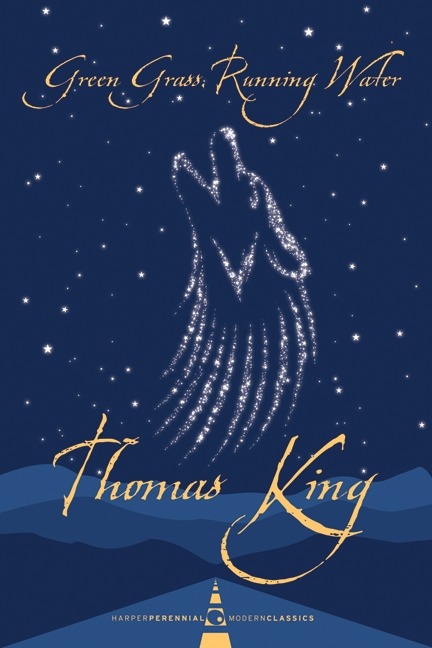ETA: If you are coming here from Ana’s link round-up, this is still happening! If you’re interested in a copy of Green Grass Running Water, leave a comment and I will pick names on the morning of 11 February.
So Ana and Iris are hosting a Long-Awaited Reads Month in January! I intended to read something much more ambitious for it, but honestly, I have been awaiting Green Grass, Running Water longer than almost anything on my TBR list. Part of me had given up hope that I’d ever be able to read it because the library never has it. Never. No library ever. I can place holds until my face falls off and this book will never, ever arrive.

Green Grass, Running Water is hard to put a synopsis too. There’s a lot going on here. The central plotline is about four Indians — they are called Ishmael, Hawkeye, The Lone Ranger, and Robinson Crusoe — who have escaped from a hospital and are telling origin stories. They might be women or they might be men. It’s unclear. The stories they are telling all feature women, certainly, and the nurse who was on duty when they vanished is sure they were women. The women of their stories are constantly running up against Christian myths and white soldiers, which does not typically end well for them.
Other parts of the book deal with a group of Indians who all come from the same reservation and have lived their lives on it or away, or on it and away. They are all dealing with their heritage in different ways or not at all, but the action of the book pulls them all back together for the Sun Dance. One is considering having a child. One made a few small mistakes in his life that prevented him from having the job and education he wanted. One is holding back a major hydraulics project by refusing to leave the house his mother built by hand. All of them encounter, in one way or another, the old escaped Indians.
It’s not always clear what’s happening in Green Grass, Running Water, which can bother me in some books. And it bothered me a bit in this book, but because the characters were always so willing to go with it, I was willing to go with it too. My favorite parts were the stories told by the four old Indians. I loved the clash between the Indian stories and the Christian stories. In particular, I loved how these stories dealt with the wiping away of Indian identity and individuality by subsuming them into manageable ideas of Indians, figures subservient to the protagonists; and how the four old Indians each ended up taking over the protagonist identities. For instance:
Here, says a nice-looking man with a grim mouth, and he hands Changing Woman a towel. What’s your name?
Changing Woman, says Changing Woman.
Call me Ishmael, says the young man. What’s your favorite month?
They’re all fine, says Changing Woman.
Oh dear, says Ishmael, looking through a book. Let’s try again. What’s your name?
Changing Woman.
That just won’t do either, says the young man, and he quickly thumbs through the book again. Here, he says, poking a page with his finger. Queequeg. I’ll call you Queequeg. This book has a Queequeg in it, and this story is supposed to have a Queequeg in it, but I’ve looked all over this ship and there aren’t any Queequegs. I hope you don’t mind.
Ishmael is a nice name, says Changing Woman.
But we already have an Ishmael, says Ishmael. And we do so need a Queequeg.
But in the end of this story, Ishmael drowns and Changing Woman takes up his name.
My favorite things, as you can probably tell, were all the parts that dealt with white portrayals of Indians. This comes up over and over again throughout the book, not only in the stories told by the Indians, but in the media consumed by the other characters. Eli, a retired professor living in his mother’s hand-built house, reads a lot of Westerns where the noble Indian character nobly gives up his white girlfriend and dies nobly in battle. Alberta and Charlie end up in the same hotel watching the same spaghetti western where the savage Indians are outnumbered and slaughtered by the brave white men. All of these parts are gorgeously acerbic.
Just, way to go, Thomas King. Green Grass Running Water was everything other bloggers have said it is. It’s funny and heartbreaking and strange and delightful. I am indebted to the always-lovely Heather for sending me her copy. In the spirit of passing on the joy, I am offering this copy to you, my fellow bloggers! Drop me a note in the comments if you want it, and I’ll draw a name at the end of the month. International readers are welcome to enter! This book is good enough I’m willing to pay the extra postage to let you enjoy it.